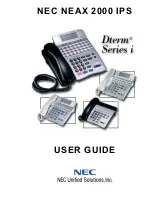
Regulatory Information
DuraFon 4X
FCC ID: NI3-SP922
IC: 3616A-SP922
This device complies with Part 15 of the FCC Rules. Operation is
subject to the following two conditions:
1) this device may not cause harmful interference, and
2) this device must accept any interference received, including
interference that may cause undesired operation.
Privacy of communications may not be ensured when using this
phone.
1.
The term “IC:” before the radio certification number only signifies that Industry of Canada
technical specifications were met.
2.
This telephone system complies with rules of the FCC Part 68 and Canadian IC/DOC CS-03.
On the bottom of the base station is a label that contains, among other information, the FCC
Registration Number, Ringer Equivalence Number (REN) and the Universal Service Order
Code, which is RJ-11C in the U.S. or CA-11A in Canada. Your telephone company may ask
you for this information.
3.
The REN is useful to determine the quantity of devices you may connect to your telephone
line and still have all devices ring when your telephone number is called. In most, but not all,
areas the sum of the REN’s of all devices connected to one line should not exceed 5.0. To
be certain of the number of devices you may connect to your phone line, you should contact
you local telephone company for the maximum REN in your area.
4.
If your telephone equipment causes problems to the telephone network, the telephone
company may ask you to disconnect your phone system from the line until the problem has
been corrected. Consult with your local phone company for your rights if this happens.
5.
Your telephone company may make changes in its facilities, equipment, operations, or
procedures that could affect the proper functioning of your telephone system. Consult with
your local phone company for your rights if this happens.
6.
This telephone system may not be used on coin service provided by the telephone company.
Connection to party lines is subject to state tariffs.
7.
This telephone system has been tested and found to comply with the limits for Class B digital
devices, pursuant to Part 15 of the FCC Rules and RSS210 of the DOC Rules. These limits
are designed to provide reasonable protection against harmful interference in a general
public installation. Operations of these devices may still encounter interference from/to
nearby TV’s, VCR’s, radios, computers, or other electronic devices. To minimize or prevent
such interference, the telephone system should not be placed or operated near other
electronic devices. If interference occurs, moving the base station and the handset farther
away from them will often reduce or eliminate the interference.
8.
However, there is no guarantee that interference will not occur in a particular installation. If
this telephone system does cause interference to other electronic devices, which can be
determined by turning the system off and on, the user is encouraged to try to correct the
interference by one or several of the following measures:
a. Increase the space separation between the handset or base station and the device that is
experiencing interference. We recommend at least 20 feet between the system and
other electronic devices.
b. Connect the base station to a power outlet on a circuit separate from that used by the
device experiencing interference.
c. Consult the dealer or an experienced electronic technician for help.







































